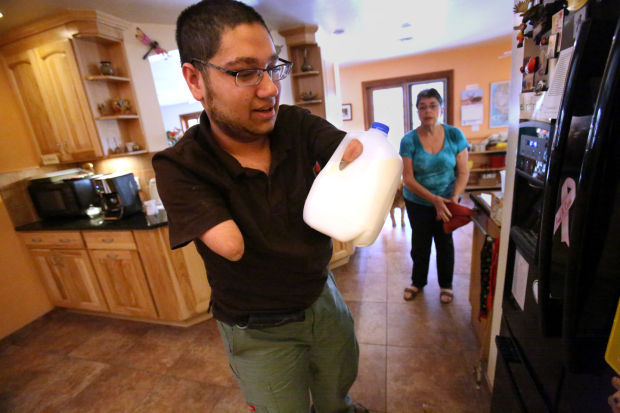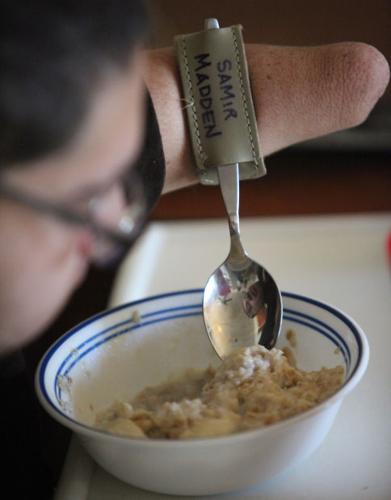A University of Arizona student is the new leader of a unique global group for children who are missing limbs.
Sami Madden , a 21-year-old religious studies major who was born without fully-formed arms or legs, was recently elected president of I-CAN, which stands for the International Child Amputee Network.
In his new role as president of I-CAN, Madden hopes to continue increasing awareness of kids with “limb differences” and in helping those kids realize their potential. The group caters to children who have been affected by limb differences at an early age, whether it’s congenital or from trauma.
One of Madden’s first big tasks will be organizing and fundraising for the 2014 I-CAN annual conference, which will be in Tucson.
Those who know Madden say he’s an extrovert and a hard-worker who has a natural ease with people. His early years were spent in an orphanage in southern India, where he was a favorite with both children and staff, according to Tucson pediatrician Dr. Bill Madden, and his wife, Beth Madden , who adopted him when he was 5. Sami Madden is the youngest of eight children in the Madden family.
“Every kid in our family has strengths and weaknesses. His interpersonal skills were always a strength,” Beth Madden said. “He is social, and he’s responsible. He’s a gift.”
Even as a tiny child in the Indian orphanage Madden was a leader, his parents say. He turned out the lights and safeguarded the facility’s keys.
Just before he left India, the orphanage gave him a big party and a memory book that he has kept, with notes and photos from children and workers.The photos show Madden walking on legs that end at the knee. His left arm ends at elbow length and his right arm extends just past his shoulder. He did not wear any leg prostheses back then, but he does now.
I-CAN, a nonprofit group, was founded in 1995 by Bill Baughn and his wife, Joyce, who lost both her arms below the elbow as a young child when she crawled under a train and it started up while she was still underneath. Joyce Baughn wanted to provide parents and children with the support that she and her family lacked while she was growing up.
“Parents don’t know what to do. A lot of them are lost, there are a lot of emotions going on. People like me can let them know that everything is going to be fine,” said Madden, who became involved in I-CAN when he was about 6 years old.
“The kids have had to deal with other kids staring at them. Some of them are shut down, bullied. We mentor kids, teens and parents. We answer things like, ‘how do you eat?’ and ‘how do you put your legs on?’ ”
In 1997, the group held its first conference in Spain. The conferences have attracted between 50 and 200 kids and their parents each year. More than 300 are on the group’s Listserv.
“During the four days of the conference, the kids are not different,” Madden said. “It’s a safe place.”
The conference includes informal question and answer sessions and the opportunity for mentoring. But it is primarily a time to network and have fun with families in similar situations. They go out to dinner, to plays and to sports games, he said.
“I was 18 years old when I first heard of I-CAN. I wish I’d known about it when I was younger, to have that sense of camaraderie and support,” said Jessica Cox , a 30-year-old Tucson resident and I-CAN member who was born without arms and is helping Sami organize next summer’s conference.
Though Madden is now both confident and comfortable with himself, his middle school years weren’t so smooth. Among other things, kids made fun of his clothes. He wore elastic waist pants because they were easier to put on, and kept them in place with suspenders.
“It (I-CAN) has given me support at times when it has been rough,” said Madden, who has undergone 14 surgeries for bone overgrowth, when his bones were growing faster than his skin. “I’ve grown into knowing that, yes, I can do anything I want.”
He drives, swims, walks and uses a computer with few difficulties.
In the future, Madden said he’d like to continue working with people who have limb differences, possibly in counseling or social work with Veteran Affairs.
Joyce Baughn, a resident of Texas who had served as president of I-CAN since her husband died in 2004, said Madden is the ideal person to take the helm of the organization. He grew up in the group, shares Bill Baughn’s original vision and has superb technological skills that will help advance the group’s online presence, she said.
Though he doesn’t have fingers, Madden does not need any assistive devices to use his smartphone, use a computer or to drive. In fact, he’s been known to take computers apart and reassemble them. He’s his parents’ technical adviser.
“Sami’s hands are his arms,” his mother said.
Any help he does need with daily tasks typically comes from his service dog, a 5-year-old golden retriever named Ashka.
By showing younger people what he can do, Madden hopes to continue being a mentorand role model to others with limb differencesthroughout his life.
“By being comfortable with who I am, I can educate others,” he said.






